Module4 Unit2 We have played football for a year now.重难点课件(共18张PPT)
文档属性
| 名称 | Module4 Unit2 We have played football for a year now.重难点课件(共18张PPT) |
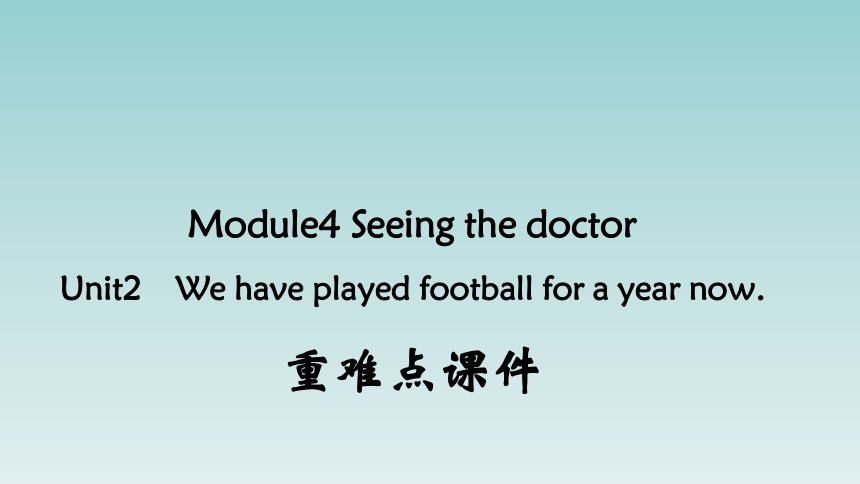
|
|
| 格式 | ppt | ||
| 文件大小 | 1.9MB | ||
| 资源类型 | 教案 | ||
| 版本资源 | 外研版 | ||
| 科目 | 英语 | ||
| 更新时间 | 2022-06-13 00:00:00 | ||
图片预览

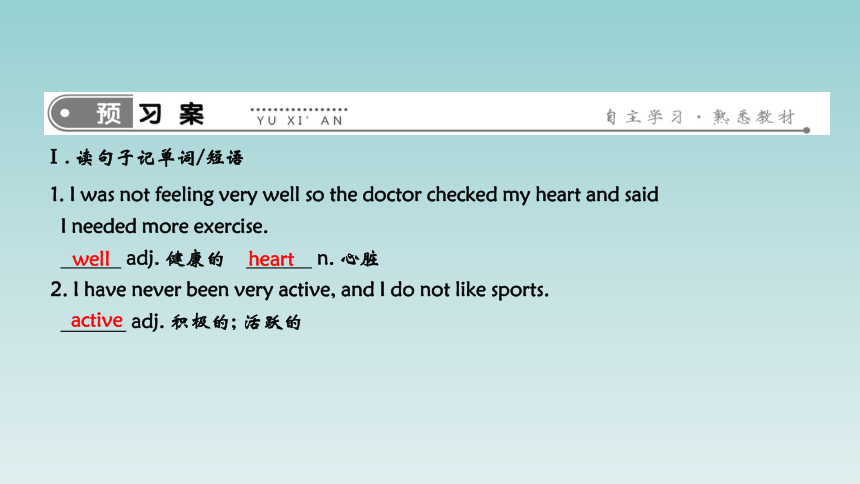
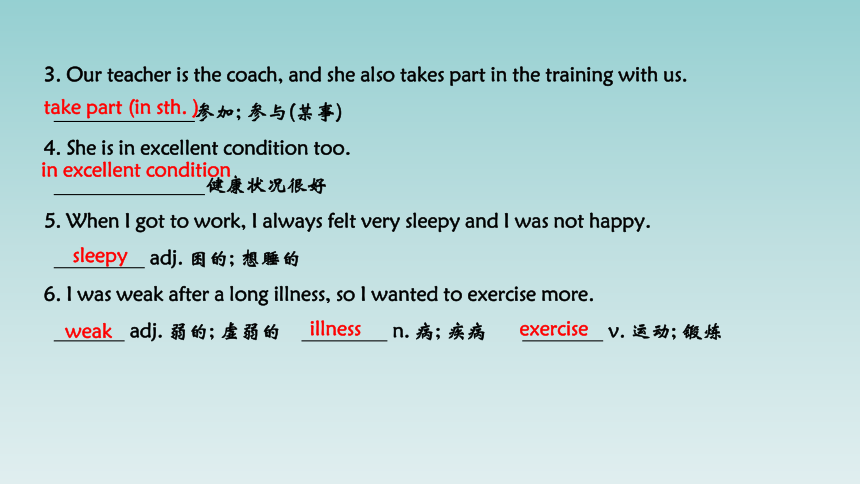
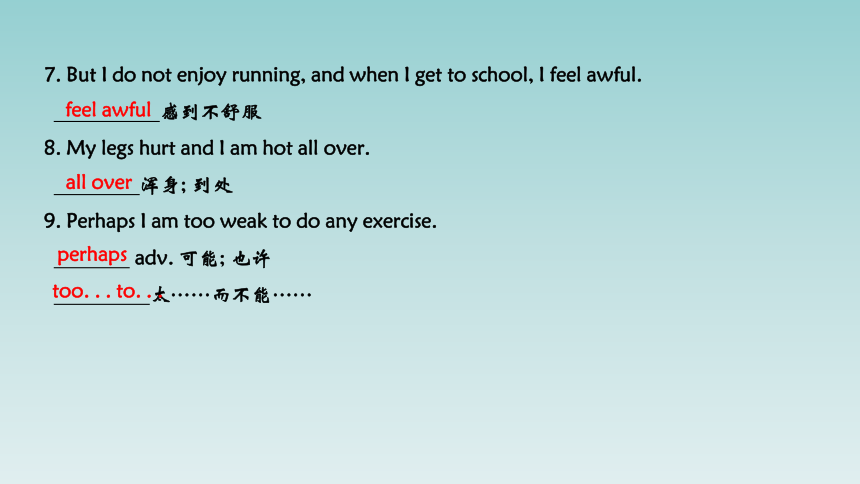
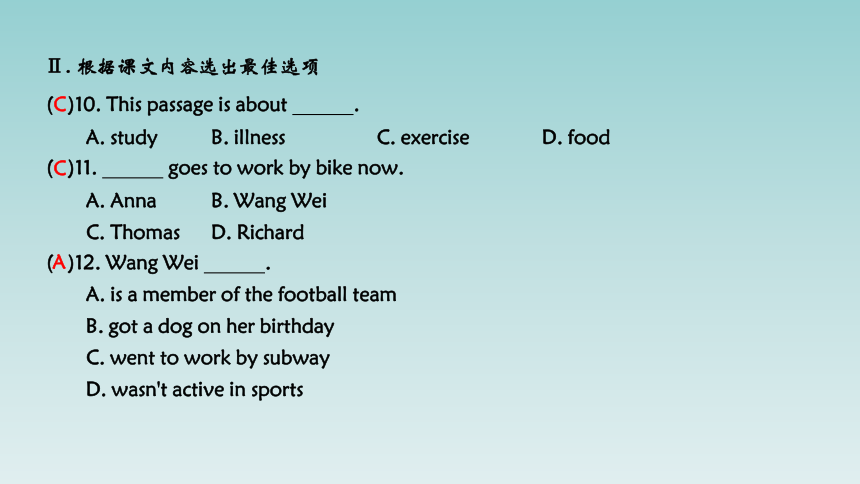
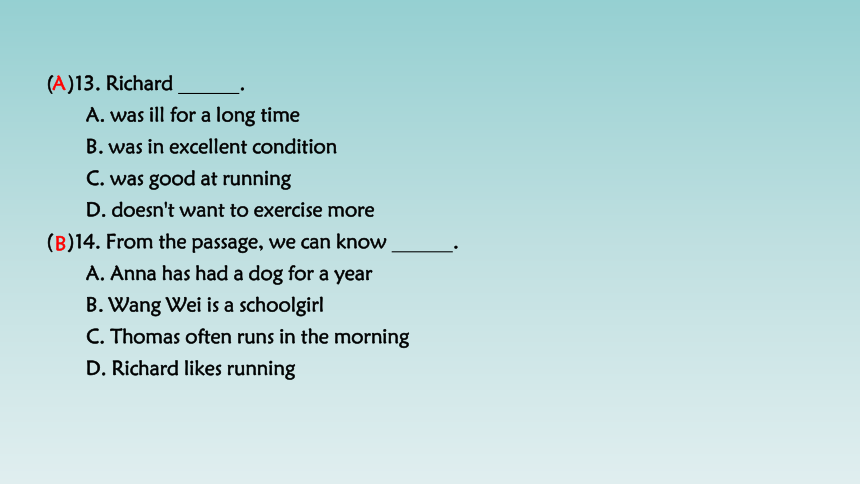

文档简介
(共18张PPT)
Module4 Seeing the doctor
Unit2 We have played football for a year now.
重难点课件
Ⅰ. 读句子记单词/短语
1. I was not feeling very well so the doctor checked my heart and said
I needed more exercise.
adj. 健康的 n. 心脏
2. I have never been very active, and I do not like sports.
adj. 积极的; 活跃的
well
heart
active
3. Our teacher is the coach, and she also takes part in the training with us.
参加; 参与(某事)
4. She is in excellent condition too.
健康状况很好
5. When I got to work, I always felt very sleepy and I was not happy.
adj. 困的; 想睡的
6. I was weak after a long illness, so I wanted to exercise more.
adj. 弱的; 虚弱的 n. 病; 疾病 v. 运动; 锻炼
take part (in sth. )
in excellent condition
sleepy
weak
illness
exercise
7. But I do not enjoy running, and when I get to school, I feel awful.
感到不舒服
8. My legs hurt and I am hot all over.
浑身; 到处
9. Perhaps I am too weak to do any exercise.
adv. 可能; 也许
太……而不能……
feel awful
all over
perhaps
too. . . to. . .
( )10. This passage is about .
A. study B. illness C. exercise D. food
( )11. goes to work by bike now.
A. Anna B. Wang Wei
C. Thomas D. Richard
( )12. Wang Wei .
A. is a member of the football team
B. got a dog on her birthday
C. went to work by subway
D. wasn't active in sports
Ⅱ. 根据课文内容选出最佳选项
C
C
A
( )13. Richard .
A. was ill for a long time
B. was in excellent condition
C. was good at running
D. doesn't want to exercise more
( )14. From the passage, we can know .
A. Anna has had a dog for a year
B. Wang Wei is a schoolgirl
C. Thomas often runs in the morning
D. Richard likes running
A
B
well的用法
I was not feeling very well so the doctor checked my heart and said I needed more exercise. (P28)我感觉不是很舒服, 于是医生检查了我的心脏, 说我需要多锻炼。
well作形容词, 意为“健康的”。通常作表语。
1. well 的用法总结
2. 辨析good与well
good 作形容词, 意为“好的”, 在句中可作表语和定语。
well 作形容词, 意为“身体健康的”, 只用作表语。
1. 我爷爷现在身体很健康。
My grandfather now.
2. 托尼学习很好并且每次都能取得好成绩。
Tony and gets marks every time.
is
well
studies
well
good
take part (in sth. )的用法
Our teacher is the coach, and she also takes part in the training with us. (P28)
我们的老师就是教练, 她也和我们一起进行训练。
take part (in sth. )为动词短语, 意为“参加, 参与(某事)”。
辨析:take part in, join与join in
take part in 主要指参加会议或某一种活动(比赛), 并在其中起到积极的作用。
join 多指参加某党派、团体、军队等组织, 并成为其中一员。
join in 多指参加小规模的活动, 如游戏、比赛等; join sb. in (doing) sth. 意为“和某人一起做某事”, in (doing) sth. 有时可以省去。
1. 他参加了写作比赛。
He the writing competition.
2. 他五年前参了军。
He the Army five years ago.
3. 让我们加入到足球世界杯的讨论中吧!
Let's the discussion of the World Cup Football.
took
part
in
joined
join
in
sleepy的用法
When I got to work, I always felt very sleepy and I was not happy. (P28)
当我开始工作的时候, 我总是感觉很困, 心情也不好。
sleepy为形容词, 意为“困的; 想睡的”。如:
I'm sleepy and I must go to bed.
我困了, 必须去睡觉了。
辨析:sleepy, asleep与sleep
sleepy 形容词, “困的; 想睡的”, 可作定语和表语。
asleep 形容词, “睡着的”, 只作表语, 不作定语, 常用短语fall asleep“入睡; 睡着”。
sleep 既作动词, 又作名词, “睡觉”。常见短语go to sleep“入睡”。
一语辨异:
Your sister falls asleep. If you feel sleepy, please go to sleep.
你的妹妹睡着了。如果你感觉困了, 请去睡觉吧。
用sleep的适当形式完成下列句子
1. He worked for the whole night, so he felt very .
2. Don't make any noise! He is .
3. They were too tired and they fell soon.
sleepy
sleeping
asleep
too. . . to. . . 句型
Perhaps I am too weak to do any exercise. (P28)
也许我的身体太虚弱了, 不能进行任何锻炼。
“too+形容词/副词+动词不定式”结构简称为“too. . . to. . . ”结构, 在多数情况下表示否定含义。有时动词不定式前面可以带有一个由介词for引出的逻辑主语。如:
The box is too heavy for me to carry.
这个箱子太重, 我搬不动。
1. “too. . . to. . . ”结构可以与“so. . . that. . . ”结构进行互换。
2. “too. . . to. . . ”结构可以与“not. . . enough to. . . ”结构进行互换。如:
She is too young to go to school.
她太小了, 不能去上学。
=She is so young that she can't go to school.
=She is not old enough to go to school.
1. 太黑了她什么也看不见。
It was dark for her see anything.
2. Teresa is nervous she can't talk in front of the class.
A. too; to B. enough; to
C. such; that D. so; that
too
to
Module4 Seeing the doctor
Unit2 We have played football for a year now.
重难点课件
Ⅰ. 读句子记单词/短语
1. I was not feeling very well so the doctor checked my heart and said
I needed more exercise.
adj. 健康的 n. 心脏
2. I have never been very active, and I do not like sports.
adj. 积极的; 活跃的
well
heart
active
3. Our teacher is the coach, and she also takes part in the training with us.
参加; 参与(某事)
4. She is in excellent condition too.
健康状况很好
5. When I got to work, I always felt very sleepy and I was not happy.
adj. 困的; 想睡的
6. I was weak after a long illness, so I wanted to exercise more.
adj. 弱的; 虚弱的 n. 病; 疾病 v. 运动; 锻炼
take part (in sth. )
in excellent condition
sleepy
weak
illness
exercise
7. But I do not enjoy running, and when I get to school, I feel awful.
感到不舒服
8. My legs hurt and I am hot all over.
浑身; 到处
9. Perhaps I am too weak to do any exercise.
adv. 可能; 也许
太……而不能……
feel awful
all over
perhaps
too. . . to. . .
( )10. This passage is about .
A. study B. illness C. exercise D. food
( )11. goes to work by bike now.
A. Anna B. Wang Wei
C. Thomas D. Richard
( )12. Wang Wei .
A. is a member of the football team
B. got a dog on her birthday
C. went to work by subway
D. wasn't active in sports
Ⅱ. 根据课文内容选出最佳选项
C
C
A
( )13. Richard .
A. was ill for a long time
B. was in excellent condition
C. was good at running
D. doesn't want to exercise more
( )14. From the passage, we can know .
A. Anna has had a dog for a year
B. Wang Wei is a schoolgirl
C. Thomas often runs in the morning
D. Richard likes running
A
B
well的用法
I was not feeling very well so the doctor checked my heart and said I needed more exercise. (P28)我感觉不是很舒服, 于是医生检查了我的心脏, 说我需要多锻炼。
well作形容词, 意为“健康的”。通常作表语。
1. well 的用法总结
2. 辨析good与well
good 作形容词, 意为“好的”, 在句中可作表语和定语。
well 作形容词, 意为“身体健康的”, 只用作表语。
1. 我爷爷现在身体很健康。
My grandfather now.
2. 托尼学习很好并且每次都能取得好成绩。
Tony and gets marks every time.
is
well
studies
well
good
take part (in sth. )的用法
Our teacher is the coach, and she also takes part in the training with us. (P28)
我们的老师就是教练, 她也和我们一起进行训练。
take part (in sth. )为动词短语, 意为“参加, 参与(某事)”。
辨析:take part in, join与join in
take part in 主要指参加会议或某一种活动(比赛), 并在其中起到积极的作用。
join 多指参加某党派、团体、军队等组织, 并成为其中一员。
join in 多指参加小规模的活动, 如游戏、比赛等; join sb. in (doing) sth. 意为“和某人一起做某事”, in (doing) sth. 有时可以省去。
1. 他参加了写作比赛。
He the writing competition.
2. 他五年前参了军。
He the Army five years ago.
3. 让我们加入到足球世界杯的讨论中吧!
Let's the discussion of the World Cup Football.
took
part
in
joined
join
in
sleepy的用法
When I got to work, I always felt very sleepy and I was not happy. (P28)
当我开始工作的时候, 我总是感觉很困, 心情也不好。
sleepy为形容词, 意为“困的; 想睡的”。如:
I'm sleepy and I must go to bed.
我困了, 必须去睡觉了。
辨析:sleepy, asleep与sleep
sleepy 形容词, “困的; 想睡的”, 可作定语和表语。
asleep 形容词, “睡着的”, 只作表语, 不作定语, 常用短语fall asleep“入睡; 睡着”。
sleep 既作动词, 又作名词, “睡觉”。常见短语go to sleep“入睡”。
一语辨异:
Your sister falls asleep. If you feel sleepy, please go to sleep.
你的妹妹睡着了。如果你感觉困了, 请去睡觉吧。
用sleep的适当形式完成下列句子
1. He worked for the whole night, so he felt very .
2. Don't make any noise! He is .
3. They were too tired and they fell soon.
sleepy
sleeping
asleep
too. . . to. . . 句型
Perhaps I am too weak to do any exercise. (P28)
也许我的身体太虚弱了, 不能进行任何锻炼。
“too+形容词/副词+动词不定式”结构简称为“too. . . to. . . ”结构, 在多数情况下表示否定含义。有时动词不定式前面可以带有一个由介词for引出的逻辑主语。如:
The box is too heavy for me to carry.
这个箱子太重, 我搬不动。
1. “too. . . to. . . ”结构可以与“so. . . that. . . ”结构进行互换。
2. “too. . . to. . . ”结构可以与“not. . . enough to. . . ”结构进行互换。如:
She is too young to go to school.
她太小了, 不能去上学。
=She is so young that she can't go to school.
=She is not old enough to go to school.
1. 太黑了她什么也看不见。
It was dark for her see anything.
2. Teresa is nervous she can't talk in front of the class.
A. too; to B. enough; to
C. such; that D. so; that
too
to
同课章节目录
- Module 1 Feelings and impressions
- Unit 1 It smells delicious.
- Unit 2 I feel nervous when I speak Chinese .
- Unit 3 Language in use
- Module 2 Experiences
- Unit 1 I've also entered lots of speaking competi
- Unit 2 They have seen the Pyramids.
- Unit 3 Language in use
- Module 3 Journey to space
- Unit 1 Has it arrived yet?
- Unit 2 We have not found life on any other planet
- Unit 3 Language in use
- Module 4 Seeing the docto
- Unit 1 I haven't done much exercise since I got m
- Unit 2 We have played football for a year now
- Unit 3 Language in use
- Module 5 Cartoons
- Unit 1 It's time to watch a cartoon.
- Unit 2 Tintin has been popular for over eighty yea
- Unit 3 Language in use
- Revision module A
- Module 6 Hobbies
- Unit 1 Do you collect anything ?
- Unit 2 Hobbies can make you grow as a person.
- Unit 3 Language in use
- Module 7 Summer in Los Angeles
- Unit 1 Please write to me and send me some photos
- Unit 2 Fill out a form and come to learn English
- Unit 3 Language in use
- Module 8 Time off
- Unit 1 I can hardly believe we are in the city ce
- Unit 2 We thought somebody was moving about
- Unit 3 Language in use
- Module 9 Friendship
- Unit 1 Could I ask if you've mentioned this to he
- Unit 2 I believe that the world is what you think
- Unit 3 Language in use
- Module 10 On the radio
- Unit 1 I hope that you can join us one day
- Unit 2 It seemed that they were speaking to me in
- Unit 3 Language in use
- Revision module B
